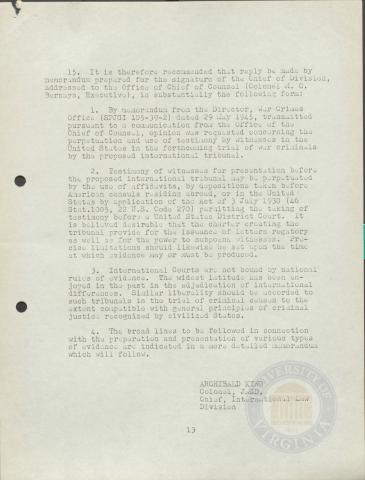
Page 13
| Parent | Perpetuation of testimony by Witnesses in U. S. for Presentation to International Military Tribunal |
|---|---|
| Date | 18 June 1945 |
| Language | English |
| Collection | Tavenner Papers & IMTFE Official Records |
| Box | Box 1 |
| Folder | General Reports and Memoranda from January 1946 |
| Repository | University of Virginia Law Library |
15. It is therefore recommended that reply be made by memorandum prepared for the signature of the Chief of Division, addressed to the Office of Chief of Counsel (Colonel M. C. Bernays, Executive), in substantially the following form:
1.By memorandum from the Director, War Crimes Office (SPJG-I 105-39-2) dated 29 May 1945, transmitted pursuant to a communication from the Office of the Chief of Counsel, opinion was requested concerning the perpetuation and use of testimony by witnesses in the United States in the forthcoming trial of war criminals by the proposed international tribunal.
2.Testimony of witnesses for presentation before the proposed international tribunal may be perpetuated by the use of affidavits, by depositions taken before American consuls residing abroad, or in the United States by application of the Act of 3 July 1930 (46 Stat.1005, 22 U.S. Code 270) permitting the taking_of testimony before a United States District Court. it
is believed desirable that the charter creating the tribunal provide for the issuance of letters rogatory as well as for the power to subpoena witnesses. Pre¬cise limitations should likewise be set upon the time at which evidence may or must be produced.
3.International Courts are not bound by national rules of evidence. The widest latitude has been en¬joyed in the past in the adjudication of international differences. Similar liberality should be accorded to such tribunals in the trial of criminal causes to the extent compatible with general principles of criminal justice recognized by civilized States.
4.The broad lines to be followed in connection with the preparation and presentation of various types of evidence are indicated in a more detailed memorandum which will follow.
ARCHIBALD KIND Colonel, JAGD, Chief, International Law Division
